| Category | Assignment | Subject | Science |
|---|---|---|---|
| University | Heriot Watt University | Module Title | B99BM Beverage Microbiology and Biochemistry |
Welcome ........................................................................................................................................................ 2
Introduction to the Course ............................................................................................................................ 2
Teaching Staff ................................................................................................................................................ 2
Course Aims ................................................................................................................................................... 3
Learning Outcomes ........................................................................................................................................ 3
Assessment .................................................................................................................................................... 4
Late Coursework ............................................................................................................................................ 5
Academic Integrity at Heriot-Watt University ............................................................................................... 5
Course Presentation ...................................................................................................................................... 5
Technical Requirements ............................................................................................................................ 5
Required Textbooks ................................................................................................................................... 6
Course Schedule ........................................................................................................................................ 6
Week 1 ................................................................................................................................................... 7
Week 2 ................................................................................................................................................... 7
Week 3 ................................................................................................................................................... 8
Week 4 ................................................................................................................................................... 9
Week 5 ................................................................................................................................................... 9
Week 6: Consolidation Week ................................................................................................................ 9
Week 7 ................................................................................................................................................. 10
Week 8 ................................................................................................................................................. 10
Week 9 ................................................................................................................................................. 11
Week 10 ............................................................................................................................................... 11
Week 11 ............................................................................................................................................... 12
Week 12 ............................................................................................................................................... 12
Student Feedback ........................................................................................................................................ 12
General Marking Scheme for Coursework .................................................................................................. 13
Further Resources………………………………………………………………………………………………………………………………….13
The last forty years have seen a tremendous explosion in the field of biotechnology – the application of biological organisms, systems or processes to the manufacturing or service industries. These applications cross many boundaries and contribute to all areas of science, including health and medicine, industrial and environmental biology, and food and nutrition. While traditional biotechnological processes have in some cases been practised for thousands of years and were first carried out without any knowledge of the underlying biology (for instance making beer and wine), the exploitation of biological systems in a rational and targeted way is dependent on a fundamental understanding of biological principles.
This course aims to describe some of these basic principles as related to the fields of biochemistry (the chemistry of biological systems), microbiology (the study of microorganisms that are too small to be seen with the naked eye) and molecular biology (the molecular basis of biological activity). These three disciplines are closely intertwined, particularly since many early biochemical studies were done with microorganisms that presented the advantages of rapid growth and ease of manipulation. It is now known that all organisms, from simple microorganisms to complex plants and animals, have a great deal in common at the molecular and cellular level, and understanding of the biochemistry and molecular biology of microorganisms is therefore relevant as the basis for appreciation of biological systems in general.
The materials in this course will consider the structure of biological molecules and cells, the growth of microorganisms, the interconversion of molecules in biological systems (metabolism), the action of enzymes, the molecular basis of genetics and some techniques for manipulating and analysing DNA and other molecules, with emphasis on the production of alcoholic beverages. The material also covers microbial spoilage and industrial fermentation. Rather than to provide exhaustive detail, the theme throughout the course is to encourage understanding of the biological principles and the ways in which appreciation of these principles has led to the exploitation of biological activities and processes.
On completion of this course, the learner will be able to:
Do You Need B99BM Assignment of This Question
Order Non Plagiarized AssignmentThe course will be assessed principally by an essay-type assignment held at the end of the semester which will contribute 60% to the overall assessment. The remaining 40% will be based on coursework consisting of completion of 2 assignments. The overall pass mark is 40%.
Only work submitted to the Grade Centre on the Canvas course via Turnitin will be marked.
Submission portals for assessments can be found in the menu item for each assignment. Be aware of when the submission deadline is, the time set for submissions for the final day will always be in GMT, it is your responsibility to be aware of the difference between this and the time zone within which you are submitting from.
The marking turnaround time is normally three working weeks from the submission deadline and return dates for each semester are published as part of the Programme timetable. After this time, you will receive your individual mark and feedback commentary. General feedback on the assignment will be posted on the VLE for this course.
Lectures will be held in Earl Mountbatten 1.83 (EM183) at 11am-1pm on Tuesdays with an online tutorial session on Friday mornings from 9am-10am. The sessions will be recorded and uploaded to Canvas. The lecture session will also be made available live to distance learning students. A discussion question will typically be set alongside the lecture release to encourage wider reading and interaction through the discussion boards on Canvas. Multiple choice questions and other activities including links to the Professional Skills Portfolio will be added for some lectures.
Week Commencing 8th September 2025
Lecture 1: Introduction
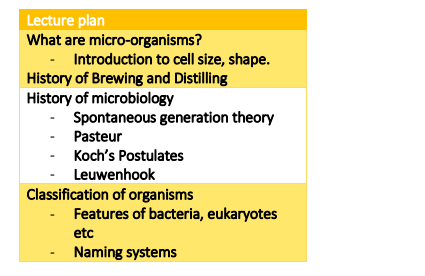
Week Commencing 15th September 2025
Lecture 2: Cell structure
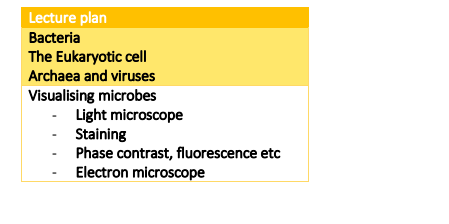
Week Commencing 22nd September 2025
Lecture 3: Chemistry of the living cell
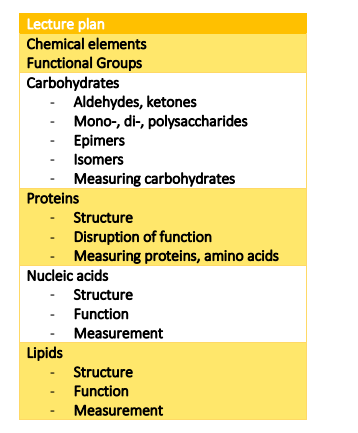
Week Commencing 29th September 2025
Lecture 4: Cell metabolism
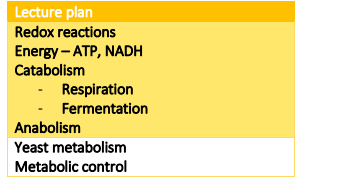
Week Commencing 6th October 2025
Assignment 1 due 12pm (GMT), Monday 6th October
Lecture 5: Microbial nutrition and culture
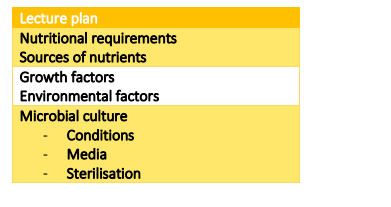
Week Commencing 13th October 2025
This week there will be no new material delivered but learning can continue, and the time will
be a good opportunity to complete the second assignment which is due on Monday 10th
November.
20th October 2024-25
Lecture 6: Microbial growth
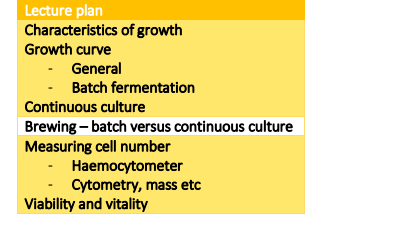
Week Commencing
27th October 2025
Lecture 7: Enzymes
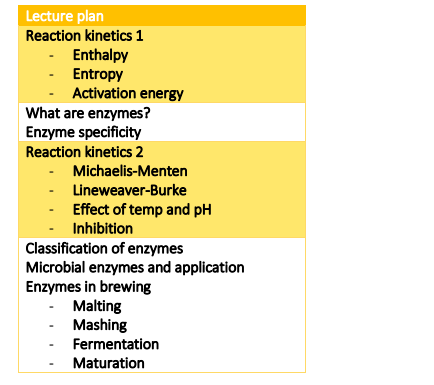
Week Commencing 3rd November 2025
Lecture 8: Microbial technology and industrial fermentation
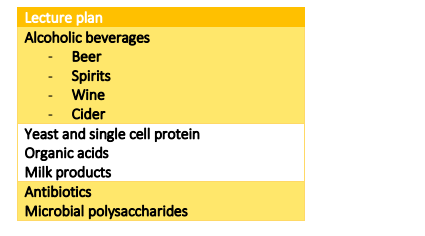
Week Commencing 10th November 2025
Assignment 2 due 12pm (GMT), Monday 10th November
Lecture 9: Microbial spoilage
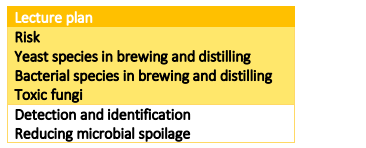
Week Commencing 17th November 2025
Lecture 10: Microbial genetics
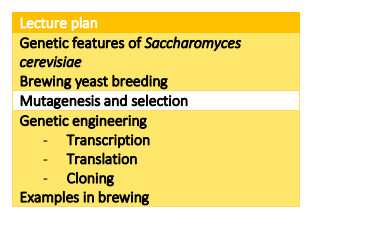
Week Commencing 24th November 2025
Revision week – the final assessment will be released on Monday 24
th November for submission
by Friday 12th December.
|
% Mark |
CAPS Grade |
Description |
|
90-100 |
A |
An excellent piece of work that shows a thorough understanding of the material, and has been presented with analysis and critical thought. The work is concise, well presented and well structured, and provides evidence of additional study outside of lecture material and provided course notes. There are virtually no errors. |
|
80-89 |
An excellent piece of work with some minor errors or deficiencies that are compensated for by other excellent work. Well presented and well structured. Shows evidence of substantial additional study. |
|
|
70-79 |
An excellent piece of work which may contain some minor errors. Shows evidence of substantial additional study and a thorough understanding of the material. Is presented in an excellent manner, with logical structure and argument. |
|
|
65-69 |
B |
A very good piece of work that shows a thorough understanding of the material, but may contain minor errors. The substantial detail is supported by reasoned argument and critical analysis, with evidence of additional study. Well presented and well structured. |
|
60-64 |
A very good piece of work that provides some evidence of additional study. There may be small errors of understanding, but the material is well presented and well structured. Meets the aims and objectives of the coursework. |
|
|
55-59 |
C |
A good piece of work that is mostly factually correct, but lacks critical thinking and analysis, and no evidence of further study. Shows some errors of understanding, but this is compensated for by other bits of good work. Well presented and structured. |
|
50-54 |
A good piece of work that is relevant to the aims of the coursework, but not complete. Relies almost exclusively on the course material provided by the department and contains significant errors of understanding. Generally well presented and structured. |
|
|
45-49 |
D |
Limited but basic level of understanding of material. Much of the relevant material is missing, or too much irrelevant material is present. May contain significant errors of fact or understanding. Adequate presentation and structure. |
|
40-44 |
Borderline pass. Limited understanding of material. Significant errors and omissions. Little or no analysis. Poor presentation and structure. Very basic. |
|
|
35-39 |
E |
Borderline fail. Attempts to meet the requirements of the work. Minimum acceptable level of understanding with significant factual errors and omissions. Poorly presented and structured. |
|
30-34 |
F |
Some relevant material provided. General failure to understand the material. Significant factual errors and omissions. Poor presentation and structure. |
|
15-29 |
Limited work. Very poor attempt. No understanding of material, although some relevant material from course notes. Irrelevant material with significant errors. |
|
|
0-14 |
Little or no attempt to complete the work |
Order Custom Answers for B99BM Assignment
Order Non Plagiarized AssignmentAre you a Heriot-Watt University student and need help with the B99BM Beverage Microbiology and Biochemistry Course? Don't worry! We are here to help you. Our professional UK assignment writers provide all types of writing services that are 100% plagiarism-free solutions with AI-free reports for your assurance. And we also provide free assignment samples written by PhD assignment writers. Contact us Today!
Hire Assignment Helper Today!
Let's Book Your Work with Our Expert and Get High-Quality Content
